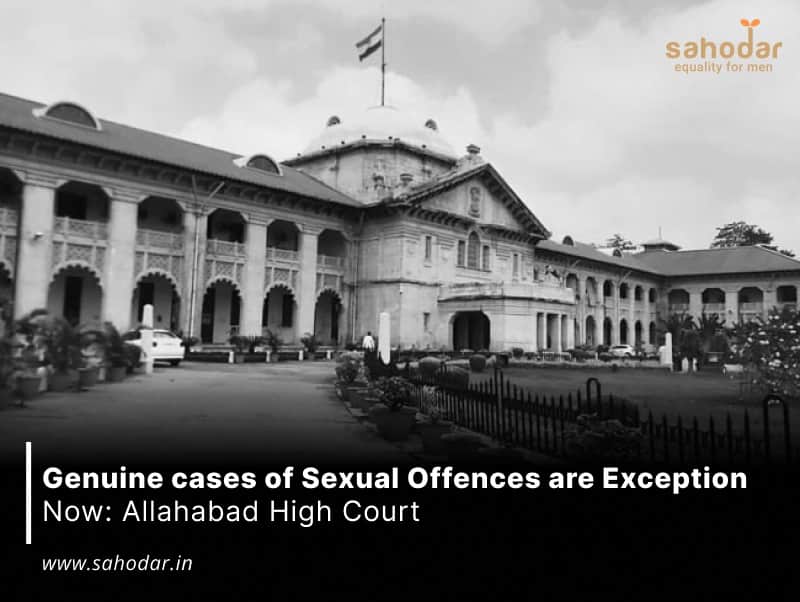The Allahabad High Court recently observed that genuine cases of sexual offences are becoming an exception now and false rape allegations have become a prevailing trend.
It also observed that an increasing number of cases are being brought in the courts where girls and women falsely lodge first information reports (FIRs) after engaging in a prolonged physical relationship with the accused to gain undue advantage or settle their self-centered intentions.
Single-Judge Justice Siddharth observed that the law is so biased against men and courts should be cautious when dealing with bail petitions in such matters.
The Court also said, “he time has come that courts should be very cautious in considering such bail applications. The law is heavily biased against males. It is very easy to make any wild allegations in First Information Report and implicate anyone on such allegations as in the present case.”
Moreover, the Court said that the influence of digital media (featuring on social media, movies, and TV shows) is silently promoting an ‘openness culture’ adopted by the boys and girls of this generation.
Nonetheless, the Court noted that when this openness behaviour clashes with Indian moral and societal values, it sometimes results in the filing of false cases against males for the protection of the girl and her family’s honor.
The Court further held, “Such First Information Reports are also lodged when after living in live-in-relationship for sometime/long time, dispute takes place between the boy and girl on any issue. Nature of partner unfolds before the other partner with time and then when they realize that their relationship cannot continue for life, trouble starts.”
The Court also said since females have advantages in terms of protection of law, they easily succeed in implicating a male in such cases as the present one.
In the case, the accused was booked for rape and a few other offences under the IPC and also offences under the Protection of Children from Sexual Offences Act (POCSO Act).
For the same, he moved the High Court and requested a bail application.
The counsel for prosecution alleged that the accused person had established sexual relations with the minor girl on multiple occasions, he married her only for sexual enjoyment.
The accused also compelled the girl to make a physical relationship with one of his cousins. In response, when she denied, the accused-applicant and his cousin abused and also beat her, it was contented.
On the other hand, the counsel for the accused argued that the survivor was a major and she had been engaged in an affair with the applicant for the last one year. She willingly left her house and went to the applicant’s aunt’s house where she got into physical relationship with the applicant on her consent.
It was also told to the Court that they got married but later on, the parents of the girl were taken her away against her wishes. Subsequently, when a dispute sparked among the family members, the girl had to lodge an FIR against the applicant.
The Court granted bail to the applicant by observing that there was a higher chance that the FIR was lodged based on false allegations and incorrect facts.
It also found that the marriage between the prosecutrix and the applicant was legally registered. However, no divorce, marriage dissolution or judicial separation through a court was found.
The Court noted that the filing of FIRs was consistently executed through written applications often prepared by legal experts or by the Munshi or Head clerk at the police station and this sort of practice is always fraught with the danger of false implication, similar to what led to in the present case.
The Court further observed, “The expert implicates all those with whom the informant/complainant has other grievances, not connected to the offence being complained whatsoever, since the lodging of complaint / F.I.R against all enemies in one stroke is encashed as an opportunity. Their roles are so meticulously shown in the F.I.R that even the most experienced of the judges falter. For the courts at district level, it is quite hazardous to grant bail in matters of such serious and meticulously made allegations because of fear of disciplinary proceedings by the higher courts.”
The Court concluded on the facts that the prosecutrix’s elopement followed by a court marriage clearly indicated that it all happened with her full consent and also undermined the entire case of the prosecution. As a result, the Court allowed the bail application of the man.
Advocate Om Narayan Pandey appeared for the applicant. On the other hand, Advocate Lakshman Tripathi appeared for the State.
Source: https://www.barandbench.com/news/litigation/genuine-cases-sexual-offences-exception-law-heavily-biased-men-allahabad-high-court

